TAAT and the imperatives of food systems transformation in Benin

In Benin, agriculture supports more than 70% of the population. It contributes around 35% of the country’s gross domestic product (GDP) and 80% of export income. Approximately 93% of total agricultural production goes into food production.
According to the U.S. Department of State’s 2023 Investment Climate Statement on Benin, about 35.2% of the population live in poverty, with more rural households in poverty (38.4%) than urban households (29.8%). Thirty (36%) of households depend solely upon agricultural (crop) production for income, and another 30% depend on crop, livestock, or fish production for income.
However, the sector faces various challenges, including limited access to modern agricultural inputs and technology, limited availability of quality seeds, weak seed production and distribution infrastructure, lack of access to improved varieties, and lack of formal seed systems.
Many farmers rely on saved seeds from previous harvests or informal seed networks, which may not always be high-quality or well-adapted to local conditions. Benin lacks robust seed production and distribution infrastructure.
There are limited facilities for seed processing, storage, and distribution, which hampers efforts to produce and deliver quality seeds to farmers promptly. Furthermore, farmers have limited access to improved seed varieties that offer higher yields, disease resistance, and other desirable traits.
This is partly due to the seed production and distribution challenges mentioned earlier. Most farmers rely on informal seed systems, such as saving seeds from their own harvests or exchanging seeds with neighbours and relatives.
While these informal systems can be important for maintaining local crop diversity, over time, they do not always provide access to improved varieties or quality seeds.
While the seed system in Benin faces significant challenges, there are also opportunities for improvement through targeted interventions, investment in infrastructure and capacity building, and the promotion of community-based seed systems for rice, cassava, maize and Soybean. These efforts are crucial for enhancing agricultural productivity, resilience, and food security in Benin.
Government efforts and investment
Benin Republic, through its Strategic Plan for Agricultural Sector Development (PSDSA), focuses on improving food and nutrition security, improving farm-level income, and building resilience to climate change within the Government Action Plan (PAG Bénin Révélé) 2016-2021.
Benin continues efforts to attract private investment in support of economic growth. The construction of a Special Economic Zone (SEZ), located at Glo-Djigbé, is also a major component of the second PAG. Located 30 miles north of Benin’s capital, Cotonou, the Glo-Djigbé Industrial Zone (GDIZ) is currently in the works under the direction of Benin’s Industry Promotion and Investment Company (SIPI), a public-private partnership.
The GDIZ is structured so that the Government of Benin owns a 35 percent stake in it, with the Mauritanian-Singaporean firm Arise Integrated International Platforms (Arise-IIP) owning 65 percent. Glo-Djigbé seeks to transform numerous locally produced agricultural products and high-tech goods for export.
Approximately 35 have signed contracts to begin operations there, including Oryx and JNP (both petroleum services); NKS (cashew processing), Groupe Aigle (cotton processing), and SIDDIH (pharmaceuticals). The GDIZ is expected to increase Benin’s GDP by $7 billion over the next decade and boost export revenues.
The primary target markets will be the United States, the European Union, and other African countries. The GDIZ covers 1,640 hectares with 400 hectares being developed currently. The current GDIZ has identified Agriculture, Road, Sanitation and Tourism as the key drivers of the economy.
The rice value chain in Benin
The main flagship project under the Food and Agriculture Compact for Benin emerging from the Dakar 2 Summit organised by the African Development Bank—under the theme ‘Feed Africa: food sovereignty and resilience’ will undertake a structural transformation of the rice sector in countries like Benin.
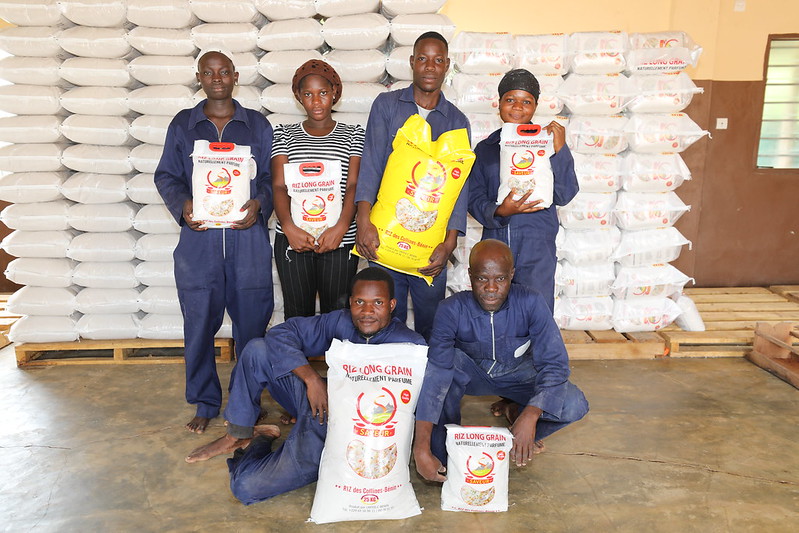
The Compact focuses on large-scale commercial rice production to supply 75 per cent of the national demand for rice, help close the gap in supply, and reduce imports to zero per cent. The Government has developed flagship projects in mechanized and irrigated agriculture, livestock feed, and organic fertilizer production to support this.
The specific objectives set for this value chain are to produce 400,000 additional tons of paddy rice (264,000 tons of white rice) by 2028, to create marketable surpluses, and to reduce imports to 0%.
The actions to be undertaken include developing an additional 20,000 hectares of lowlands under irrigation (total water control) to support 2 crops per year. Various scenarios for yield improvement are projected, ranging from Low: 4 Tons/Ha, Medium: 7 T/Ha, and High: 10 T/Ha. The medium scenario of 7 T/HA aims to produce 280,000 tons of paddy rice or 184,800 Tons of white rice per year.
In support of the Government’s emphasis on the rice sector, the Technologies for African Agricultural Transformation (TAAT), in collaboration with the Sasakawa Africa Association (SAA), organised a two-day Training of Trainers (ToT) for Extension Agents, Subject Matter Specialists and Lead Rice Farmers in the republic of Benin.
The ToT, which was held from 29 January to 1 February 2024 at Covè, Southern Benin, was organized under the auspices of the Policy and Human Resources Development (PHRD) Grant of Japan through the African Development Bank.
The participants were trained on Good Agronomic Practices for rice (GAP), Post-harvest Handling Practices, Urea Deep Placement (UDP), Biochar technology, Climate change and its effect on agriculture, Alternate Wetting and Drying (AWD) Demo protocol/Layout and farmers networking and profiling. The trainees also underwent field practical sessions on demarcation and line planting.
Intensifying Sorghum/Millet production
After Maize and rice, Sorghum and millet are the major cereal crops in Benin. Both crops, mainly sorghum, occupy an important place in the diet of the population of the central and northern parts of the country.
They are used as staple food crops and for breweries, particularly red sorghum, which is used to produce local wine. According to FAOSTAT data, in the last 8 years, the average area cultivated per year with sorghum in the country was 158,524 ha, with an average annual production of 164,685 t.
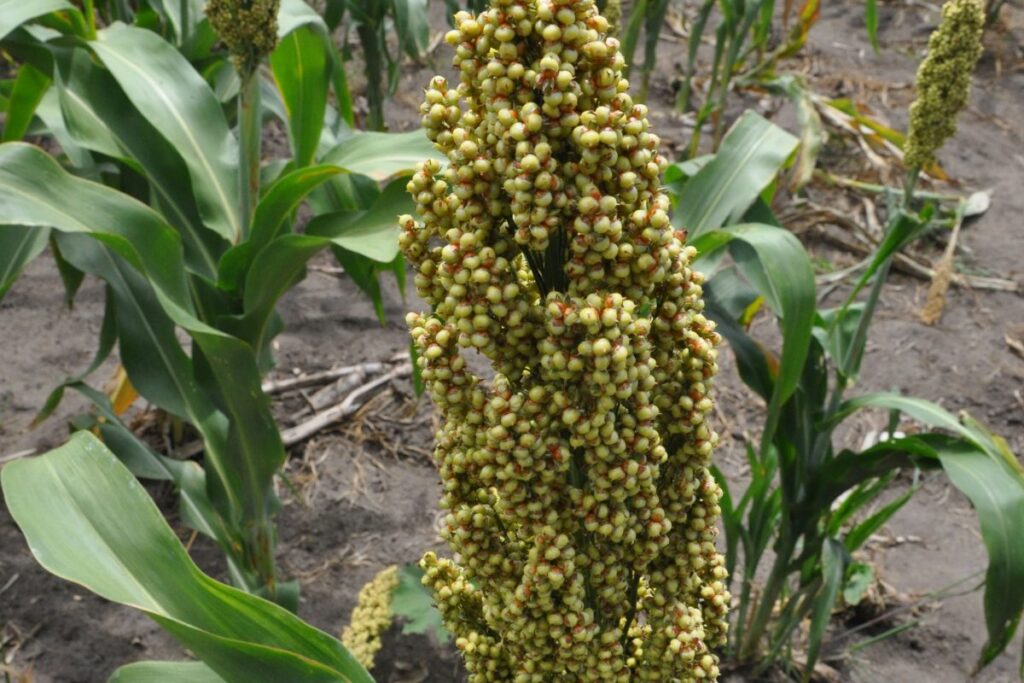
The average area cultivated per year with millet in the country was 26,966 ha with an average annual production of 25,290 t. Compared with maize, the proportion is 13% for sorghum and 2% for millet.
The Sorghum and Millet Compact (S&MC) is one of the eleven value chain Compacts of TAAT, implemented by the International Crops Research Institute for Semi-Arid Tropics (ICRISAT).
The TAAT Sorghum/Millet Compact brings its experience from implementing the first phase of TAAT in seven countries, five of which were in West Africa and two in central Africa, and working with a consortium of sorghum/millet value chain actors.
A sustainable Cassava seed system
Cassava is a staple food for about 350 million people in sub-Saharan Africa. In 2003, African Heads of State declared it a poverty fighter. It is also a very important food crop in Benin.
Many Beninese families resort to the consumption and therapeutic use of cassava (Manihot esculenta). Since the mid-1980s, Benin has increased production of yams, cassava, maize, peanuts, and pulses, but poor infrastructure, low yields (less than 20t/ha), and flooding, which can wipe out harvests and seed stocks, are major challenges Benin farmers face.
TAAT, in collaboration with the International Institute of Tropical Agriculture (IITA), is set to boost cassava production in the Republic of Benin through the facilitation of a robust and sustainable seed cassava seed system for the country.

This will be made possible via extensive partnerships with the National Institute of Agricultural Research of Benin (INRAB), Université d’Abomey Calavi, Laboratoire de Biotechnologies (BIORAVE), Ressources Génétiques et Amélioration des Espèces Animales et Végétales and GRIGADEB.
The partnership will seek to increase productivity on existing farmlands by making readily available and accessible high-yielding planting materials targeting 30 tons per hectare and accessing agri-food markets through processing, storage, and transportation solutions for cassava and cassava products.
Towards increased vegetable production
Vegetables are important crops for income generation and nutrition. In Benin, many exotic and traditional vegetables are grown and consumed.
However, vegetable production is constrained by the low availability of improved varieties, high-quality seeds, and high disease and pest pressure, along with poor technical know-how of vegetable growers.
World Vegetable Center under various projects including the Safe Locally produced Vegetable for West Africa Consumers (SafeVeg), the Fruits and Vegetable for Sustainable Healthy Diets (FRESH), Choose Grow and Thrive in partnership with INRAB, and the University of Abomey-Calavi have introduced improved vegetable varieties of which about 30 are currently in the release process (application submitted to the National Seed Committee) and pre-dissemination is ongoing with the distribution of seed mini-kits to about 3,000 vegetable growers across the country.
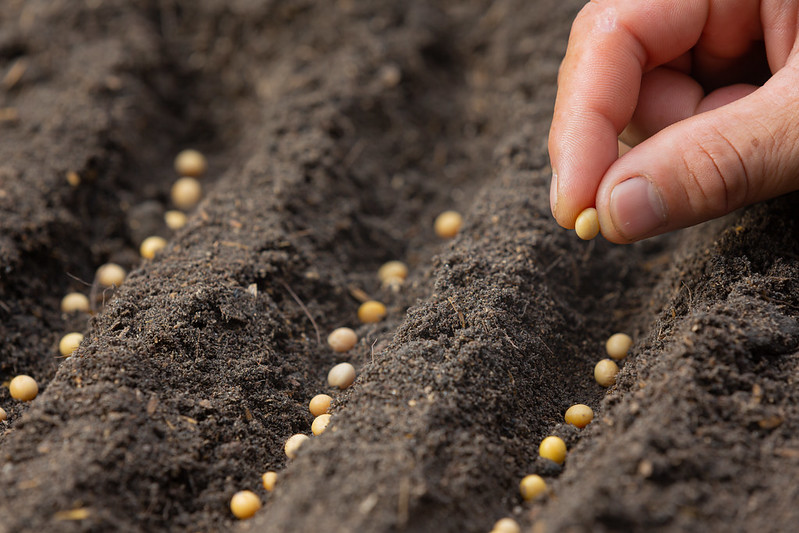
Besides, WorldVeg has led the organization of capacity-building training sessions for local vegetable seed producers to improve their technical, and managerial skills in seed production.
Additional trainings are planned under the TAAT Vegetable Compact led by WorldVeg. Under SafeVeg, FRESH, and CGT, WorldVeg upon the request of the Ministry of Agriculture has led the development of a roadmap for the vegetable seed sector .
Since 2020, in collaboration with PADMAR, an IFAD-funded project, WorldVeg has been building the capacity of vegetable growers in good agricultural practices, and post-harvest, and promoted the use of improved vegetable varieties.
Under TAAT, the Vegetable Compact works with INRAB to train vegetable seedling producers, seed demand forecasting, conduct nutritional campaigns to boost vegetable consumption, demonstrate the performance of improved varieties in regions not covered by ongoing projects.
A robust system for Maize and Soybean
With the increase in their production and their prized label, Beninese soybeans are increasingly targeting the Chinese and European markets. Being competitive is essential to taking advantage of the market and producing better.
In many parts of the world, maize is considered the most important cereal crop in terms of quantity and area, ahead of wheat and rice. In Benin, maize is one of the staple foods of various ethnic and socio-cultural groups.
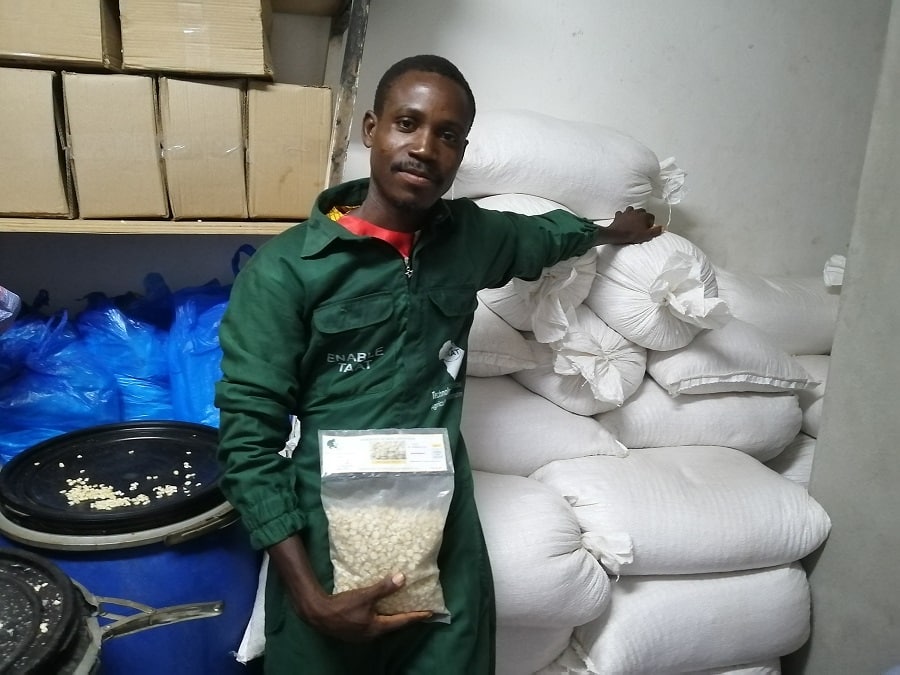
Several value chain actors are producing this cereal as it represents a real business opportunity. Despite the potential of the maize crop, several factors hinder the optimisation of its production.
These include soil fertility problems, poor cultivation techniques, climate change effects, and the lack of good seed and suitable varieties. The seed road-map’s development is anticipated to provide the framework and resources to boost the production of the major commodities alongside maize and soybeans.
Boosting Fish production
At the Dakar 2 Country Compact meeting, Benin aspired to produce 5,000 tonnes of farmed fish. This will include building ten aquapoles, each 25 hectares of pond, to be completed by 2026, using high-quality certified and climate-smart fish seeds and feed, and processing and value addition.
The Government plans to develop over 500 ha of aquaculture zones by constructing new hatcheries and improving access to key inputs. This intervention concerns the Project for the Promotion of Aquaculture and the Competitiveness of Fisheries Value Chains (PROMAC).
It aims to increase the contribution of the fisheries and aquaculture sector to local and national economies, food security, job creation, and income generation by promoting aquaculture, fisheries governance, and improving the added value of fish.
The PROMAC’s activities aim to develop agricultural value chains and the agro-industry in economically and socially disadvantaged areas with significant fishing and aquaculture potential.
Benin’s PROMAC-Project, led by the Ministry of Agriculture, Livestock and Fisheries (MAEP), aims to develop aquaculture and competitiveness of the fish value chain.
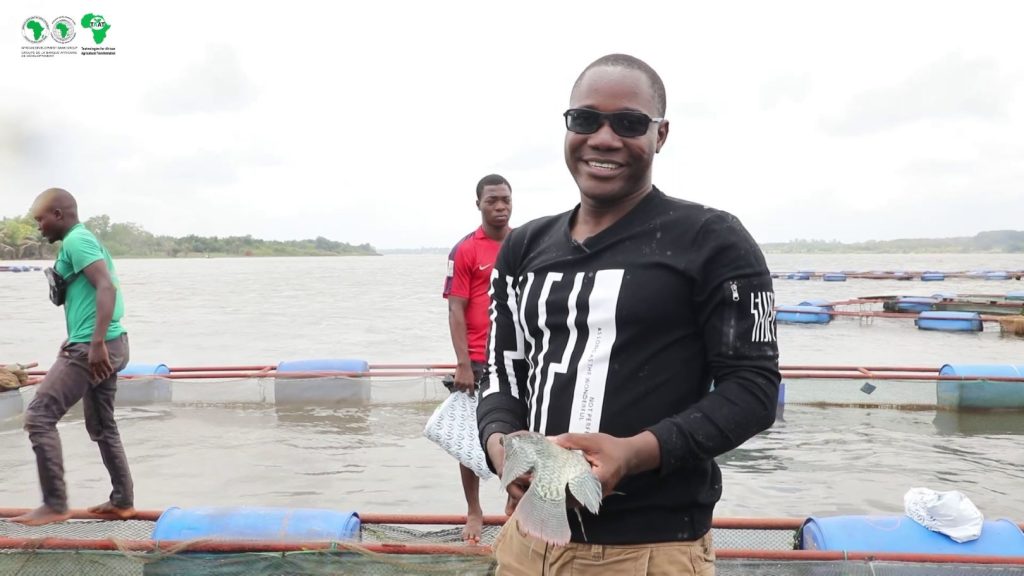
The WorldFish Centre and the TAAT Fish Compact are supporting the project by building capacity on appropriate aquacultural technologies to produce quality catfish and tilapia seed, low-cost fish feed from locally available ingredients, fish processing, and value addition to reduce post-harvest losses.
A sustainable forage system for increased livestock production
Estimated at 12 kg per capita per year, the level of consumption of animal protein in Benin is below the minimum recommended consumption threshold set by the Food and Agriculture Organisation for developing countries (21 kg per inhabitant per year).
According to data from the National Institute of Statistics and Demography (INStad), in 2021, Benin imported approximately 115,800 tonnes of meat and edible offal, fresh, chilled, or frozen from poultry, worth nearly 60 billion CFA francs (US$100 million).
The main constraints identified for the poultry value chain in Benin are the High prevalence of deadly diseases such as Newcastle disease, inadequate veterinary extension services, limited access to quality and affordable feed, and sub-optimal genetic characteristics of indigenous chickens. The genetic performance of the local chicken breed is low (egg and meat production). A dual-purpose chicken breed introduction could raise production by closing the productivity gaps.
TAAT, in collaboration with the International Livestock Research Institute (ILRI), will transfer proven solutions developed, tested, and deployed in Kenya, Tanzania, and Nigeria by setting up public and private livestock centres and locally maintaining improved breeds (chickens) to be multiplied and disseminated to rural farmers, training beneficiary farmers, and setting up processing facilities.
Furthermore, the development of a sustainable forage system is the solution to feed shortages, farmer-herder clashes, and increased livestock production (Milk, meat, etc.).
TAAT will deploy climate-smart feed and forage interventions to create a sustainable feed and forage supply. A forage seed system will be developed with capacity development for relevant national stakeholders.
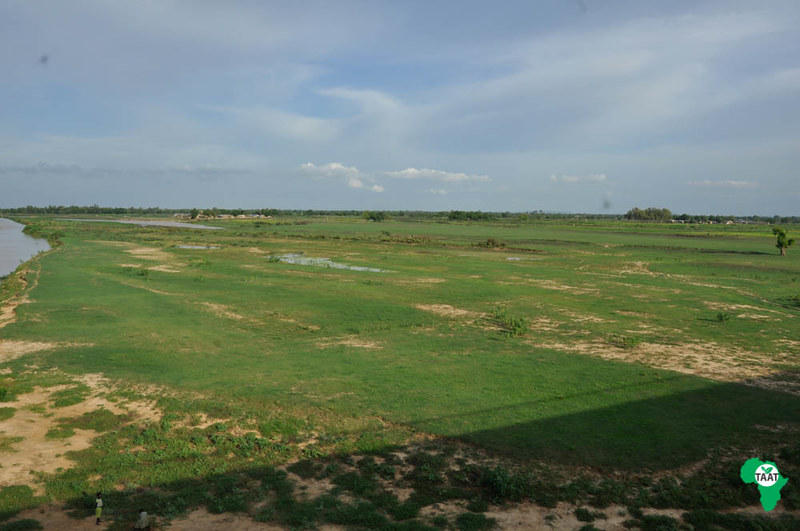
A Seed Roadmap for Benin
To fully realise the aforesaid objectives and propel the republic of Benin towards a food and nutrition-secure future, TAAT, in collaboration with stakeholders from Benin and across Africa, is organising a summit to draw a seed roadmap for the West African country.
The consortium of organisers includes the Government of Benin, Technologies for African Agricultural Transformation (TAAT)of the African Development Bank, Building an Economically Sustainable Integrated Cassava Seed System, Phase 2 (BASICS-II) project of the IITA, the Sasakawa Africa Association (SAA) in Nigeria, Sahel Consulting Ltd and Mennonite Economic Development Associates (MEDA).
The two-day Seed Business Summit, with the theme “Building a Harmonized Roadmap for Seed Sector Transformation,” is being organized in collaboration with the Beninese Ministry of Agriculture, Livestock and Fisheries (MAEP), the Beninese National Institute for Agricultural Research (INRAB), and other stakeholders.
The summit will be held from the 20th to the 22nd of June 2024 in Cotonou, the Beninese capital. The forum aims to catalyse an agricultural revolution in Benin by establishing an economically sustainable seed system for priority crops like rice, cassava, maize, soybean, livestock, fish, sorghum and millet.

